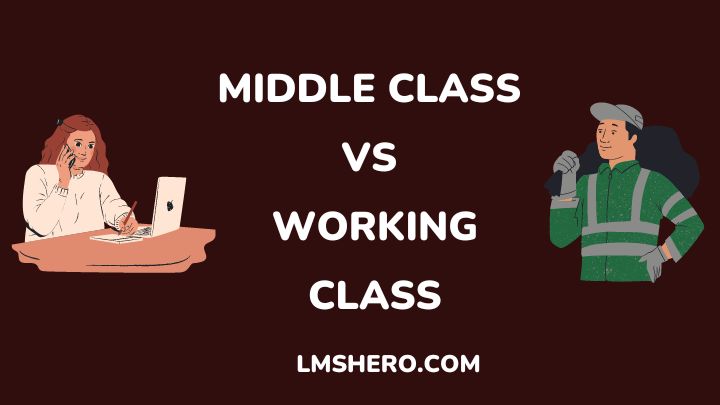The middle class and working class, due to differences in their levels of education, values, lifestyles, occupations, and social grouping are two groups of people.
The middle class is somewhere in between the upper class and the working class, while the working class is just above the underclass. There are also many differences in the classes of people that are included in both social groups.
This article provides a thorough explanation of each sort of socioeconomic class and differentiates between the middle class and the working class.
Read to learn more.
Middle Class

The term “middle class” is often used for people who belong to the middle of a society’s social order. From a socioeconomic standpoint, this category typically sits between the working class and the upper class.
The middle class consists of people such as managers, professionals, academics, lawyers, engineers, doctors, white-collar employees, and civil servants.
Notably, jobs deemed to be middle-class demand some postsecondary education but often do not require physical work.
However, there are other factors that determine if or not an individual belongs to the middle class, such as tertiary education, professional certifications, values and manners, lifestyle, cultural identification, etc.
Working Class

The term “working class” refers to groups of people who are employed in jobs that are deemed to be of a lower status.
Working-class folks are common in industrialized countries as they are described as those who create economic value and make a living through non-academic means.
Generally, working-class workers are also people whose jobs demand physical labor. They can be split into four categories which are; Out workers, laborers, artisans, and unskilled industrial workers.
Middle Class vs Working Class: Differences
Generally, the middle and working classes are two socioeconomic groups defined according to the nature of their jobs, education, values, lifestyles, impact on society, etc.
The term “working class” and “middle class” are often used when discussing a country’s politics, economics, and socioeconomic issues. However, there are multiple differences between them.
Most people in the middle-class category have postsecondary education and professional certifications. They are professionals like doctors, teachers, accountants, lawyers, engineers, professors, and so on.
The working class category is made up of laborers, factory workers, artisans, etc. And they do not require postsecondary education, however, they do require physical abilities, strength, skill, etc.
Hence, the fundamental difference between these two social groups is education and profession, and not their earnings.
For example, brick masons earn around $47,000 in the US. While teachers’ aides, and lab technicians, earn between $23,000 and $33,000.
However, the following are the key differences between the middle class and the working class:
| Middle class | Working class |
| The middle class is described as those who occupy the middle of a society’s social order. | The working class is described as those groups of people that are employed in jobs that are considered to be of a lower tier. |
| The term “middle class” refers to those with some form of tertiary education and professional qualifications who are employed in jobs requiring college and professional qualifications. | The term “working class” refers to people employed as laborers, casual workers, artisans, etc., who do not require any postsecondary education. |
| People in this category are mostly doctors, teachers, accountants, lawyers, engineers, academics, etc. | People in this category are mostly restaurant employees, auto mechanics, construction workers, etc. |
FAQs
What are other social classes?
Generally, there are five social classes, which are the upper, upper-middle, middle, working, and lower classes.
Working class is also called?
The working class is often called the proletariat.
What is the difference between the upper, middle, and lower classes?
The main difference between them is based on their income.
The lower class earns the least, while the upper class gets the most, and the middle class earns somewhere between the two.
Conclusion
The middle class and working class are often associated with wealth and income, but it is typical for people to juggle between them during the course of their lives. For instance, someone born into a working-class family can someday rise to the middle class.
While the middle class is more likely to own their own home, and a car, send their children to college, save for retirement, and have enough money to pay for luxuries such as eating out and taking vacations, the working class mostly doesn’t have that opportunity.
However, despite the general belief that working-class people are unskilled and uneducated, they are important to every economy.
I hope you found this article interesting. You can also read to know what a lower-class house means.
Thanks for reading.






